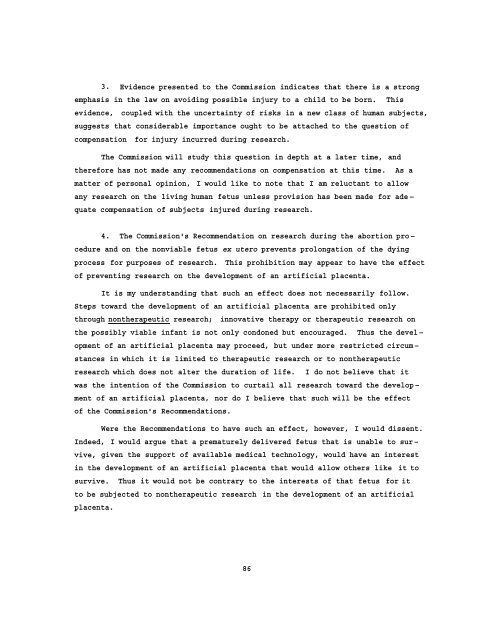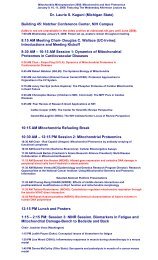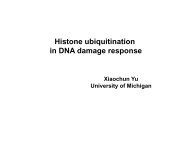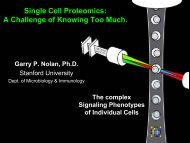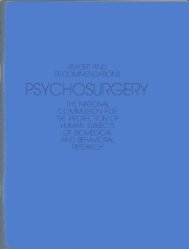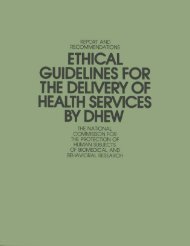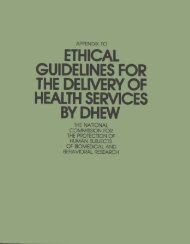RESEARCH ON THE FETUS - National Institutes of Health
RESEARCH ON THE FETUS - National Institutes of Health
RESEARCH ON THE FETUS - National Institutes of Health
You also want an ePaper? Increase the reach of your titles
YUMPU automatically turns print PDFs into web optimized ePapers that Google loves.
3. Evidence presented to the Commission indicates that there is a strong<br />
emphasis in the law on avoiding possible injury to a child to be born. This<br />
evidence, coupled with the uncertainty <strong>of</strong> risks in a new class <strong>of</strong> human subjects,<br />
suggests that considerable importance ought to be attached to the question <strong>of</strong><br />
compensation for in jury incurred during research.<br />
The Commission will study this question in depth at a later time, and<br />
therefore has not made any recommendations on compensation at this time. As a<br />
matter <strong>of</strong> personal opinion, I would like to note that I am reluctant to allow<br />
any research on the living human fetus unless provision has been made for adequate<br />
compensation <strong>of</strong> subjects in jured during research.<br />
4. The Commission's Recommendation on research during the abortion procedure<br />
and on the nonviable fetus ex utero prevents prolongation <strong>of</strong> the dying<br />
process for purposes <strong>of</strong> research. This prohibition may appear to have the effect<br />
<strong>of</strong> preventing research on the development <strong>of</strong> an artificial placenta.<br />
It is my understanding that such an effect does not necessarily follow.<br />
Steps toward the development <strong>of</strong> an artificial placenta are prohibited only<br />
through nontherapeutic research; innovative therapy or therapeutic research on<br />
the possibly viable infant is not only condoned but encouraged. Thus the development<br />
<strong>of</strong> an artificial placenta may proceed, but under more restricted circumstances<br />
in which it is limited to therapeutic research or to nontherapeutic<br />
research which does not alter the duration <strong>of</strong> life. I do not believe that it<br />
was the intention <strong>of</strong> the Commission to curtail all research toward the development<br />
<strong>of</strong> an artificial placenta, nor do I believe that such will be the effect<br />
<strong>of</strong> the Commission's Recommendations.<br />
Were the Recommendations to have such an effect, however, I would dissent.<br />
Indeed, I would argue that a prematurely delivered fetus that is unable to survive,<br />
given the support <strong>of</strong> available medical technology, would have an interest<br />
in the development <strong>of</strong> an artificial placenta that would allow others like it to<br />
survive. Thus it would not be contrary to the interests <strong>of</strong> that fetus for it<br />
to be subjected to nontherapeutic research in the development <strong>of</strong> an artificial<br />
placenta.<br />
86


